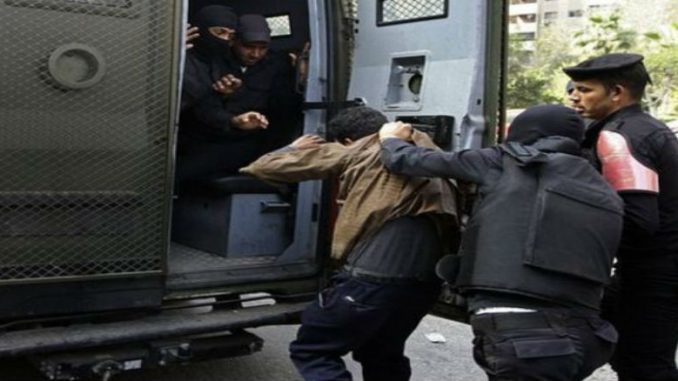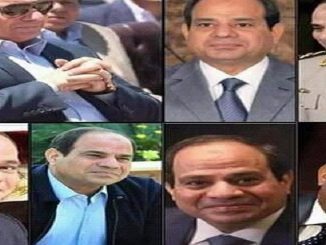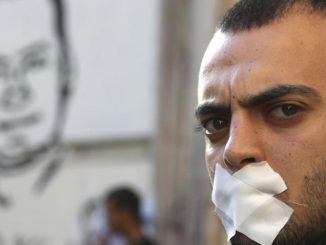
An Egyptian prosecutor ordered on Tuesday that a lawyer to be detained for 15 days after the publication of a picture of him wearing a yellow vest similar to those worn by protesters in France, a local rights activist said.
The arrest in the northern city of Alexandria came as traders said authorities were blocking the sale of the vests to forestall any copycat protests ahead of the January 25 anniversary of Egypt’s 2011 uprising.
Since the election of Abdel Fattah al-Sisi in 2014, Egypt has seen a crackdown on political opposition and dissent that activists say is the most severe for decades.
The yellow safety vests have been the trademark of French demonstrators whose violent weekend protests since November 17 forced President Emmanuel Macron to cancel planned fuel tax increases and grant wage rises for the poor.
Alexandria’s public prosecutor ordered the detention of rights lawyer Mohamed Ramadan after the publication of a picture of him sporting a yellow vest in solidarity with the French protesters, said Mahienour El Masry, an activist in the city.
Two security sources said Ramadan had been found in possession of eight such vests. The Alexandria prosecutor’s office did not immediately respond to a request for comment.
In downtown, Cairo traders said they had been stopped from selling the vests to walk-in customers.
“They made us sign statements that we won’t sell yellow vests,” said one trader who like others declined to give his name. “Anyone who sells a single vest will put himself in big trouble.”
He refused to sell any of the yellow vests in his shop window, which were priced at just over $1. “Now they’re for display only, “he said.
January Revolution Anniversary
An employee at another downtown shop said the restriction on selling the vests had started on Saturday and would continue until January 25, the eighth anniversary of the popular uprising that toppled then-president Hosni Mubarak.
At a third shop, a worker said the vests could only be supplied for commercial orders.
Security sources confirmed that authorities had prevented industrial security suppliers from selling the yellow vests.
“It is a question of caution, rather than fear,” said one of the sources, when asked if authorities were afraid of protests ahead of the anniversary.
Abdel Fattah al-Sisi, the former Defense Minister who led the military coup in 2013 against Egypt’s first democratically elected President Mohamed Morsi, has proved to be more repressive than Hosni Mubarak, who was toppled in the Arab spring according to the Economist Magazine.
In the crackdown since Sisi’s rule in 2014, thousands of his opponents and critics, as well as alleged Islamist militants and secular rights activists, have been arrested.
One activist contacted said spontaneous protests such as those in France were now impossible in Egypt.
“Opposition political movements do not have a presence on the ground and current political parties are part of the regime,” said the activist, who asked to be identified only by his first name, Mustafa.
“More importantly, the location of all activists is now known…They are either in prison or in their houses subject to police supervision.”
Fear from Protests
Despite al-Sisi’s heavy crackdown on freedoms in Egypt, his regime tightens its grip over any sign of protests in the country. Al-Sisi’s regime is afraid of any protests that would widen by time as what happened in the uprisings of 2011.
This fear resides from the fact that popular dissent has recently increased as a result of harsh economic conditions.
Months ago, hashtag “Sisi Leave” in (Arabic) has been trending in Egypt with people urging Abdel Fattah al-Sisi to resign amid recent austerity measures carried out as part of economic reforms ordered by the International Monetary Fund (IMF).
The hashtag was a result of a slash in fuel prices and transportation by 50%, in addition to an increase in electricity prices and piped drinking water.
This was the third time since Egypt floated their pound in 2016, the government increase prices with an expectation to pile more pressure on Egyptians struggling to make ends meet. This comes as the price of a loan from the IMF. The fiscal reforms left many Egyptians worse off.
The hashtag flooded Egyptian social media, with people urging al-Sisi to leave threatening of going on protests that might be similar to 2011 uprising.
An Egyptian actor, producer, and director based in LA, Khaled Abol Naga, re-tweeted an old video for al-Sisi in 2016 while he is promising that there will be no future increase in Egypt.
Some users went to remind Sisi of earlier remarks he made on his leaving when he said.”If you want me to quit, I will quit.”Others went to repost images from 2011 uprising known as the January 25 Revolution, calling on Egyptians to do it again.
Besides the economic unrest and hard living conditions, al-Sisi’s government has long been criticized by international human rights groups for cracking down on secular and left-wing activists, as well as Islamists close to the banned Muslim Brotherhood.
Al-Sisi was sworn in for his second four-year term with a slide victory, though the election was widely seen as a farce. All other political competitors either arrested, sidelined or withdrew.



